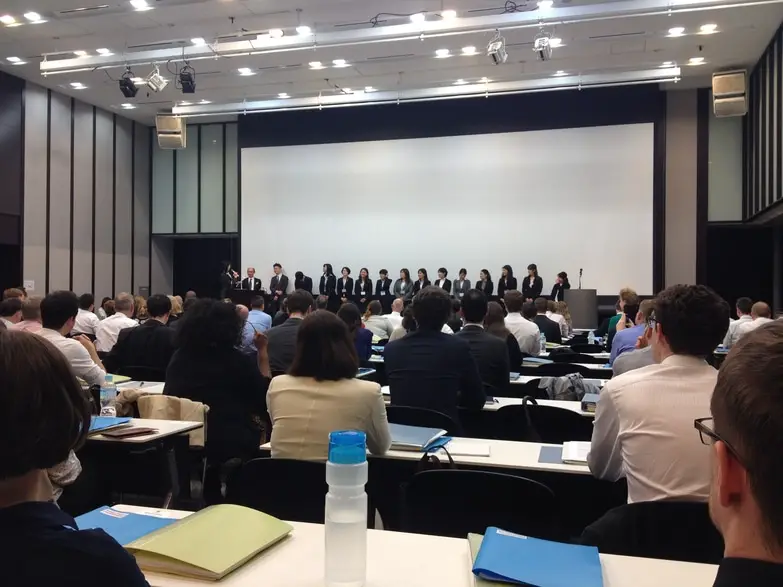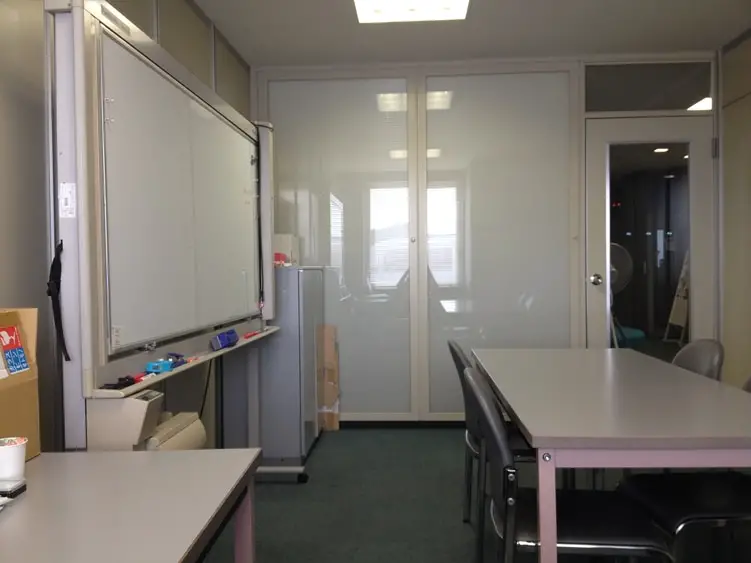Now that you’ve applied to teach in Japan with Westgate Corporation, your next step will be an intense hour-long (or more) interview. How should you prepare for the questions?
To make sure you do your best in the interview, be sure to prepare (and practice):
- A structured lesson plan
- Answers to common grammar mistakes by Japanese students
- Answers to common interview questions that showcase your teaching ability with beginner-level students
- Finally—do a bit of research and demonstrate your knowledge of expectations regarding Japanese work culture.
OF COURSE some tips are obvious such as be on time (read: EARLY) and dress in business attire (just take a look at the Westgate website to see how they expect their teachers to dress and DO THAT for your interview).
I had my interview two years ago via Skype with Philip from the HR department. He had obviously been doing this for a very long time and had the process down to a science. Some of my colleagues were interviewed by other Westgate employees. They all seem to be very kind but also direct and serious.
After my interview on March 17th, I got a job offer on March 22nd with Westgate in Nagoya teaching the extra-curricular program at an all-women’s university. I had an amazing experience and would recommend it, but the application and interview process can be daunting and it’s good to BE PREPARED.

You might also want to check out my article reviewing Westgate Corporation in detail here, where I talk about salary, apartments, curriculum, and more 🙂
#1- Spend some time creating a structured lesson plan for beginners
This is the easy part because you are told in advance to plan a lesson! You can easily control and dominate this part of the interview and there’s no reason not to. Also, if you’re doing a Skype interview, you can prepare a cheat sheet with all of your notes!
It seems that Westgate interviewees are all emailed in advance something along the lines of:
“Imagine you are teaching a 40 minute oral communication lesson with high-beginner level Ss. Imagine you have about 10 to 12 students in the class. The students are university-aged. The objective is for the students to talk about likes and dislikes. Could you tell me how you would structure that kind of lesson/what stages you would go through?”
Now, if you’ve done your CELTA or another similar teaching certificate, you probably feel very comfortable with putting together stages of a lesson.
For my interview, I didn’t want to take any chances so I designed a very detailed lesson plan and was prepared to talk about each stage in detail, down to the minute. I explained exactly what I would write on the board (I think I had planned some examples), what I would say exactly, the handouts I would use, how I would deal with anticipated problems… basically everything required of the lessons we planned in CELTA observations.
I don’t think it needed to be fancy or super creative for the Westgate interview, but I think they appreciated that I had put time into it and that it followed one of the standard lesson planning stages frameworks (such as PPP).
I always think it’s best to overprepare. If you don’t have time during the interview to get to everything you’ve prepared, they’ll at least see your dedication and that you cared enough to put a lot of thought into your planning process.
You’ll also come to find out that Westgate (and perhaps work culture in Japan in general) is very detail-oriented, so you are preparing yourself to work in this sort of environment. If this doesn’t sound fun to you at all, this might not be the right fit!

#2- Prepare yourself to correct common grammar mistakes by Japanese students
I heard from unsuccessful interviewees on forums and blogs that this was the part of the interview where they stumbled the most.
I had the opportunity before my interview to teach many Japanese students, which was helpful for this part of the interview. But if you’ve never taught Japanese students, you might want to take some time to do a little research on what grammar issues they struggle with most.
In my interview, I was asked specific grammar questions. Take a look and see if you can answer the questions below:
- What is the problem with saying “Almost Japanese people like rice”? Why?
- What is the problem with saying “Japan is very safety.” Why?
- What is the difference between “I am bored” and “I am boring”? How about interested/interesting? Scared/scary? Excited/exciting?
- What is wrong with: “I have much apples” and why?
If you’re struggling with these questions, check out my answers at the bottom of this post.
You might also be asked to explain abstract vocabulary words to low-level, beginner students (words such as punctual, eventually, wonderful).
Since you can’t exactly prepare yourself for this, I recommend using the same strategy that I recommend teachers use when explaining a concept to their students—don’t just say the first thing that pops into your head. Pause. Take your time. Think for a minute and then give as simple and clear of an answer as possible.
At some point in the correction part of the interview, the interviewer might ask you to speak as if you were correcting a student. So, as strange as this feels, try to put yourself in the teacher mindset and gently correct your interviewer’s mistakes…

#3- Think about common interview questions and how you can use them to show off your teaching experience
This is the flexible part of the interview that you should take advantage of to show off your resume, experience, and skills that might not be apparent in the other sections.
It’s a good idea to be very familiar with your own resume and teaching background and to prepare a few anecdotes that make you look good as a teacher. Take some time to brainstorm your past successful lessons, great encounters with past students, or insightful experiences in your teaching training.
You can work these anecdotes into many different questions that might be thrown your way during the interview, and you can seize those opportunities to shine.
Think about your strengths, your weaknesses (which are actually just skills you almost have, and that you’re working on improving daily!), your reasons for becoming a teacher, your conflict management style, how you plan and draw inspiration for your lessons… your teaching philosophy… how you feel about teaching beginners (because almost all Westgate students are low-level as far as I’m aware).
Of course, you should also prepare a brief summary or “elevator pitch” (about a minute) of your background and why you’re applying for this program (kind of your “about me”). Something along the lines of “Tell me about yourself…” will inevitably come up at the beginning of your interview and it’s better to be prepared, in control, and comfortable right from the start.
#4- Familiarize yourself with Japanese work culture
Take some time to look up what is expected of workers in a Japanese professional environment. Westgate is very serious about its teachers adhering to certain codes of conduct, including dressing appropriately for work. That meant, for me, wearing business attire in the middle of hot, humid Nagoya summer months (!).
You might get questions about how you would resolve a conflict with a student or colleague. What do you know about resolving conflicts in Japan? Have you ever had experience resolving conflicts with students or colleagues? (Remember, if you’re going to tell these sorts of anecdotes, make sure they end with you in the best light, making good decisions or learning from your mistakes!)
At Westgate, you’ll have a Japanese and English-speaking intermediary/point of contact that you can get in touch with if you ever have any issues with the school you’re working at or with your students. You are supposed to contact them with any issues or questions so that is really your answer for how to resolve problems: reach out to your point of contact for help!

Grammar answers from Tip #2
What is the problem with saying “Almost Japanese people like rice”? Why?
Almost is an adverb that is used before an adverb or a verb (not a noun).
We could fix this sentence by saying “Almost all Japanese people like rice” because “almost (adverb) + all (adjective)” works before a noun (‘Japanese people’ – which is technically an adj + noun).
What is the problem with saying “Japan is very safety”? Why?
Safety is a noun. In this sentence, we are trying to describe Japan. Therefore, we need to use an adjective—and the adjective form of this word is “safe.”
What is the difference between “I am bored” and “I am boring”? How about interested/interesting? Scared/scary? Excited/exciting?
This is a common mistake for many English learners. Bored and boring are both adjectives, but one is the past participle (bored) of the verb to bore and one is the present participle (boring) of the verb to bore. And they each hold a different meaning.
Bored describes the feeling or emotion that someone is having (such as: The student felt/was very bored during the class); while boring describes the quality of something (such as: The movie was very boring).
The same is true of the other word pairs (scared/scary; excited/exciting).
What is wrong with: “I have much apples” and why?
Much is used with uncountable nouns and many is used with countable nouns. If students are struggling with this, it’s best to revisit the difference between uncountable and countable nouns.
In this sentence, “apple” is a countable noun so we should say instead “I have many apples.”
